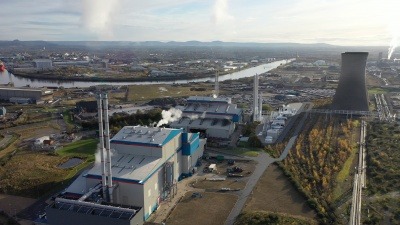SUEZ consults local communities on plan to build carbon capture plant
SUEZ recycling and recovery UK (SUEZ) has launched a three-week pre-application consultation with local communities and their representatives around its plans to build a carbon capture plant on land next to its energy-from-waste facility on the Haverton Hill Industrial Estate in Billingham.
 In order to engage with local communities and their representatives to get feedback on the plans, prior to submitting its planning application, SUEZ will be distributing information leaflets to local households and businesses ‘over the coming days’. This will involve an invitation to complete a feedback form before the consultation closes on Sunday 11 December.
In order to engage with local communities and their representatives to get feedback on the plans, prior to submitting its planning application, SUEZ will be distributing information leaflets to local households and businesses ‘over the coming days’. This will involve an invitation to complete a feedback form before the consultation closes on Sunday 11 December.
SUEZ says the proposed carbon capture plant could decarbonise the process of creating energy from the non-recyclable household waste that is treated at one of the EfW facilities at SUEZ’s existing site in Billingham. The company plans for the plant to be built on a one-hectare area of disused land on the site, becoming part of the larger East Coast Cluster carbon capture and storage (CCS) project.
According to SUEZ, the plant could remove more than 90 per cent of fossil and biogenic CO2 emissions from the existing energy-from-waste facility it connects to, and capture 240,000 tonnes of carbon every year.
The captured carbon would be transported by a short connecting pipeline to the main ‘East Coast Cluster’ Carbon Capture and Storage pipeline – which would run through the Haverton Hill site. Funding for this main pipeline, which is located in Teesside, is already in place and is expected to be operational by 2027.
Stuart Hayward-Higham, Technical Development Director for SUEZ recycling and recovery UK said: “We are proud to have been a part of the industrial landscape here at Haverton Hill for many years and the location of the site, alongside the East Coast Cluster pipeline, makes it an ideal place to bring together energy-from-waste and carbon capture technologies.
“Consulting and engaging with local communities is important, and we’re looking forward to having discussions and receiving feedback on the plans over the coming weeks.”
“As part of our journey towards net zero, we have a clear focus on reducing the carbon footprint associated with managing our customers’ waste. Carbon capture technology is an important part of this journey, offering the opportunity to further decarbonise the treatment of the residual waste left after people have reused and recycled. Through projects like this, our goal is to help households, councils and business decarbonise their waste.”






